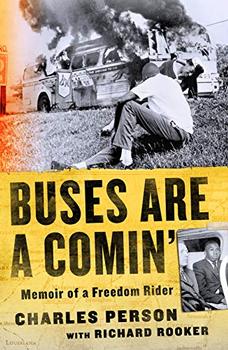Summary | Excerpt | Reading Guide | Reviews | Beyond the Book | Readalikes | Genres & Themes | Author Bio

Memoir of a Freedom Rider
by Charles Person, Richard Rooker
I looked down the road and saw a large caravan of cars with strange lights coming from them. Crosses ablaze in fire were fixed on the front of their hoods. They lit the night sky like fireworks. It was strange, and it was beautiful. I thought a religious service might be starting. The people in the cars were all wearing the same robes. Bright white like the crosses on their cars, and they had cone-shaped hoods that covered their faces with big holes for their eyes but nothing for their noses or mouths. They mostly looked like a group heading to church in their robes, but the hoods made them look like Halloween costumes, not church outfits.
I could tell the adults we were staying with were frightened. Dad and Mom, too. I wanted Dad to explain.
"What is it, Dad?"
The adults talked in whispers I could not hear. The caravan drove right down the street. Car after car looked the same. Churchgoer after churchgoer looked the same.
I did not know the word surreal at that age, but if I had, this was that. Mixed emotions filled me: the excitement of the parade; the curiosity of the new; the bright crosses filling the dark sky; the funny church outfits we never wore at our church. All this mixed with a sense of danger and a mood of dread. The adults were not acting the way I was. Their whispers contrasted with my enthusiasm. I felt the way Kenneth looked when he invited me inside Papa's to open the trunk, but I could tell I was not supposed to.
The parade ended. We waited without saying a word. I wanted to scream.
"Why won't anyone tell me what is going on?" my mind yelled.
But when everyone is hushed, you hush up, too. I didn't say a word.
After about thirty minutes—who knows how long it really was, kids can't judge time in any meaningful way—we got back on the road. Dad drove cautiously and in silence. It seemed to me his face and his eyes spent as much time looking into the rearview mirror as they did looking ahead at the road.
I was confused because Dad was not afraid of anybody, but I knew he was scared. He was concerned for me, for him, for us. Silence. The whole way home to Atlanta.
It's hard to see your father fearful. Like any boy, I looked up to my dad, and I saw him as strong. As the strongest man I knew. I was so proud to be his son. That day, I remember seeing him afraid—physically afraid. That was a difficult day in my life. I did not like seeing Dad scared. No child does.
Dad was a man of few words. That day he gave me no words. So I did not know the meaning of what I was experiencing except that it had a lot to do with fear. Soon enough I would learn—I don't remember how—these men with their crosses and flames and costumes were not Christians, and they scared the hell out of black people. That was my first encounter with the KKK. It would not be my last.
Both of those days—on the weekend hike up Stone Mountain and the drive down the country road—the Klan was nearby and threatening. Neither day brought immediate harm, but both instilled fear. I had no way of knowing that another day would come when I would be face-to-face with the Klan and learn what they were capable of doing. I'm glad that in the days of my youth—the days in the Bottom—I was too young, too innocent, to understand the bizarreness of my times.
Hugh Person's life was hard. In the military, he served his country. At home, he served his family. But work wore Dad out. Dad had to leave work at sixty-four in 1986 after suffering a degenerative disease. He was in the hospital less than a week. Nobody expected him to die, but he did. I think Dad died of being worn-out by the hardship of this life. I think this world was unkind to my father. I miss the Pall Mall Reds, no filter. I miss the transmission-oil smell. I miss the hair combed back. I miss the man I saw so little of and can never see again.
* * *
These are the people—Kenneth and Mom and Papa and Dad—who shaped me as a boy. The Bottom is the place that taught me how fortunate and rich I was and am. From Mom, I learned kindness, forgiveness, hard work, and singing. All these gifts I tried to carry with me through life, though singing would get me into trouble a few years down the road.
Excerpted from Buses Are a Comin' by Charles Person and Richard Rooker. Copyright © 2021 by Charles Person and Richard Rooker. Excerpted by permission of St. Martin's Press. All rights reserved. No part of this excerpt may be reproduced or reprinted without permission in writing from the publisher.




We should have a great fewer disputes in the world if words were taken for what they are
Click Here to find out who said this, as well as discovering other famous literary quotes!
Your guide toexceptional books
BookBrowse seeks out and recommends the best in contemporary fiction and nonfiction—books that not only engage and entertain but also deepen our understanding of ourselves and the world around us.